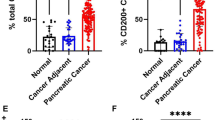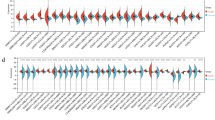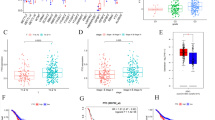Abstract
The ectonucleotidase CD73 degrades adenosine triphosphate (ATP) to adenosine which potently inhibits host immune responses against cancer. This study investigated the expression level and prognostic significance of CD73 in human rectal adenocarcinoma. Our data demonstrated that CD73 staining strongly marked both malignant epithelial cells and stromal components where the protein and messenger RNA (mRNA) expression levels of CD73 were significantly increased compared with paracancerous controls. High CD73 expression in tumor cells can be used as an independent factor for predicting poor patients’ prognosis; however, patients with higher density of stromal CD73 were more likely to have favorable characteristics (early T and tumor-node-metastasis (TNM) stages) and overall survival. Notably, combined CD73 expression analysis in both tumoral and stromal compartments was more efficient to foretell patient’s outcome where patients with increased CD73 in tumor cells but decreased CD73 in stroma displayed a worst prognosis. Taken together, the current study revealed CD73 expression was increased in both tumoral and stromal compartments. Although upregulated CD73 expression in tumor cells correlates with a poor prognosis in patients with rectal adenocarcinoma, the combination of CD73 expression in malignant epithelial cells and tumor stroma may have a better prognostic value.





Similar content being viewed by others
References
Siegel R, Naishadham D, Jemal A. Cancer statistics. CA Cancer J Clin. 2013;63:11–30.
Antonioli L, Pacher P, Vizi ES, Haskó G. CD39 and CD73 in immunity and inflammation. Trends Mol Med. 2013;19:355–67.
Beavis PA, Stagg J, Darcy PK, Smyth MJ. CD73: a potent suppressor of antitumor immune responses. Trends Immunol. 2012;33:231–7.
Antonioli L, Blandizzi C, Pacher P, Haskó G. Immunity, inflammation and cancer: a leading role for adenosine. Nat Rev Cancer. 2013;13:842–57.
Burnstock G, Di Virgilio F. Purinergic signalling and cancer. Purinergic Signal. 2013;9:491–540.
Stagg J, Smyth MJ. Extracellular adenosine triphosphate and adenosine in cancer. Oncogene. 2010;29:5346–58.
Gao ZW, Dong K, Zhang HZ. The roles of CD73 in cancer. Biomed Res Int. 2014;2014:460654.
Beavis PA, Divisekera U, Paget C, Chow MT, John LB, Devaud C, et al. Blockade of A2A receptors potently suppresses the metastasis of CD73+ tumors. Proc Natl Acad Sci U S A. 2013;110:14711–6.
Loi S, Pommey S, Haibe-Kains B, Beavis PA, Darcy PK, Smyth MJ, et al. CD73 promotes anthracycline resistance and poor prognosis in triple negative breast cancer. Proc Natl Acad Sci U S A. 2013;110:11091–6.
Terp MG, Olesen KA, Arnspang EC, Lund RR, Lagerholm BC, Ditzel HJ, et al. Anti-human CD73 monoclonal antibody inhibits metastasis formation in human breast cancer by inducing clustering and internalization of CD73 expressed on the surface of cancer cells. J Immunol. 2013;191:4165–73.
Allard B, Pommey S, Smyth MJ, Stagg J. Targeting CD73 enhances the antitumor activity of anti-PD-1 and anti-CTLA-4 mAbs. Clin Cancer Res. 2013;19:5626–35.
Häusler SF, Del Barrio IM, Diessner J, Stein RG, Strohschein J, Hönig A, et al. Anti-CD39 and anti-CD73 antibodies A1 and 7G2 improve targeted therapy in ovarian cancer by blocking adenosine-dependent immune evasion. Am J Transl Res. 2014;6:129–39.
Eroglu A, Canbolat O, Demirci S. KocaogluH, Eryavuz Y, Akgül H. Activities of adenosine deaminase and 5′-nucleotidase incancerous and noncancerous human colorectal tissues. Med Oncol. 2000;17:319–24.
Wu XR, He XS, Chen YF, Yuan RX, Zeng Y, Lian L, et al. High expression of CD73 as a poor prognostic biomarker in human colorectal cancer. J Surg Oncol. 2012;106:130–7.
Pagnotta SM, Laudanna C, Pancione M, Sabatino L, Votino C, Remo A, et al. Ensemble of gene signatures identifies novel biomarkers in colorectal cancer activated through PPARγ and TNFα signaling. PLoS One. 2013;8:e72638.
Yamauchi M, Lochhead P, Morikawa T, Huttenhower C, Chan AT, Giovannucci E, et al. Colorectal cancer: a tale of two sides or a continuum? Gut. 2012;61:794–7.
Maenaka S, Hikichi T, Imai MA, Minamoto T, Kawahara E. Loss of imprinting in IGF2 in colorectal carcinoma assessed by microdissection. Oncol Rep. 2006;15:791–5.
Wang RY, Chen L, Chen HY, Hu L, Li L, Sun HY, et al. MUC15 inhibits dimerization of EGFR and PI3K-AKT signaling and is associated with aggressive hepatocellular carcinomas in patients. Gastroenterology. 2013;145:1436–48. e1-12.
Allard B, Turcotte M, Stagg J. CD73-generated adenosine: orchestrating the tumor-stroma interplay to promote cancer growth. J Biomed Biotechnol. 2012;2012:485156.
Pancione M, Giordano G, Remo A, Febbraro A, Sabatino L, Manfrin E, et al. Immune escape mechanisms in colorectal cancer pathogenesis and liver metastasis. J Immunol Res. 2014;2014:686879.
Valencia T, Kim JY, Abu-Baker S, Moscat-Pardos J, Ahn CS, Reina-Campos M, et al. Metabolic reprogramming of stromal fibroblasts through p62-mTORC1 signaling promotes inflammation and tumorigenesis. Cancer Cell. 2014;26:121–35.
Loddenkemper C, Schernus M, Noutsias M, Stein H, Thiel E, Nagorsen D. In situ analysis of FOXP3+ regulatory T cells in human colorectal cancer. J Transl Med. 2006;4:52.
Mandapathil M, Hilldorfer B, Szczepanski MJ, Czystowska M, Szajnik M, Ren J, et al. Generation and accumulation of immunosuppressive adenosine by human CD4 + CD25highFOXP3+ regulatory T cells. J Biol Chem. 2010;285:7176–86.
Stagg J, Divisekera U, Duret H, Sparwasser T, Teng MW, Darcy PK, et al. CD73-deficient mice have increased antitumor immunity and are resistant to experimental metastasis. Cancer Res. 2011;71:2892–900.
Salama P, Phillips M, Grieu F, Morris M, Zeps N, Joseph D, et al. Tumor-infiltrating FOXP3+ T regulatory cells show strong prognostic significance in colorectal cancer. J Clin Oncol. 2009;27:186–92.
Frey DM, Droeser RA, Viehl CT, Zlobec I, Lugli A, Zingg U, et al. High frequency of tumor-infiltrating FOXP3(+) regulatory T cells predicts improved survival in mismatch repair-proficient colorectal cancer patients. Int J Cancer. 2010;126:2635–43.
Snider NT, Altshuler PJ, Wan S, Welling TH, Cavalcoli J, Omary MB. Alternative splicing of human NT5E in cirrhosis and hepatocellular carcinoma produces a negative regulator of ecto-5′-nucleotidase (CD73). Mol Biol Cell. 2014;25:4024–33.
Acknowledgments
A special thanks to Dr. Huafeng Wei and Dr. Wen Wen for their technical assistance.
Funding
This work was supported by the Beijing Natural Science Foundation (7133254 to BZ). The funders had no role in the study design, data collection and analysis, decision to publish, or preparation of the manuscript.
Conflicts of interest
None
Author information
Authors and Affiliations
Corresponding author
Additional information
Bin Zhang and Bin Song contributed equally to this work.
Electronic supplementary material
Below is the link to the electronic supplementary material.
ESM 1
(DOC 36 kb)
ESM 2
(DOC 38 kb)
Supporting Figure 1
Correlations of CD73 expression in tissue microarrays from human rectal adenocarcinoma. (A, B) Assessment of the homogeneity of CD73 expression in tumoral and stromal compartments by Spearman’s rank correlation analysis. For each patient, five representative images (200×) were captured each time, with two mean values evaluated (Average density of tumoral and/or stromal CD73). (C) Correlation of CD73 density between tumoal and stromal compartments was validated. (GIF 44 kb)
Supporting Figure 2
Microdissection procedure for fresh frozen malignant area. For laser capture microdissection, frozen section of human rectal adenocarcinoma (A) was used to select the representative areas (B), and then cut (C) and catapulted in the cap of a microtube (D). (GIF 144 kb)
Supporting Figure 3
The prognostic significance of combining CD73 expression in both tumoral and stromal compartments of human rectal adenocarcinoma. (A, B, C) The OS rates of patients with high (above median) or low (below median) CD73 levels in tumoral and stromal compartments were compared using Kaplan-Meier analysis. (GIF 50 kb)
Supporting Figure 4
Up-regulated CD73 expression levels in primary and metastatic tumor tissues of human rectal adenocarcinoma. Representative western blot showing the expression of CD73 protein in paired primary tumor (Ca) and peritumor tissues (N), tumor draining lymph nodes (TDLN), and liver metastasis (LM). The expression levels of CD73 protein were normalized to that of β-actin by calculating the relative expression levels. (GIF 10 kb)
Supporting Figure 5
CD73 overexpression in tumor stroma predicts favorable prognosis of human rectal adenocarcinoma. The OS rates of patients with limited disease (A), early T stage (B), well tumor differentiation (C), or without lymphatic metastasis (D) were compared between the high (above median) and low (below median) stromal CD73 groups. (GIF 42 kb)
Rights and permissions
About this article
Cite this article
Zhang, B., Song, B., Wang, X. et al. The expression and clinical significance of CD73 molecule in human rectal adenocarcinoma. Tumor Biol. 36, 5459–5466 (2015). https://doi.org/10.1007/s13277-015-3212-x
Received:
Accepted:
Published:
Issue Date:
DOI: https://doi.org/10.1007/s13277-015-3212-x




